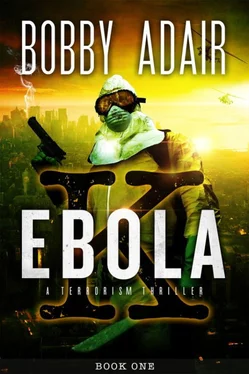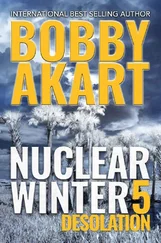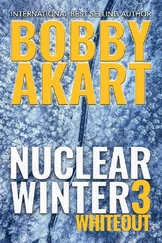In the back seat, his man positioned himself in the center, and pointed his muzzle up between the seats and out through the windshield.
The road snaked through a few curves, finally coming to a section that ran straight. Not too far in the distance, a few vehicles sat in the middle of the road.
The driver slowed, and Najid commanded him to stop. He flung his door open, jumped out, and raised his weapon to his shoulder, using the door for whatever cover it provided. The two men with him positioned themselves on the other side of the Land Rover.
A man was jogging up the road toward the SUV before the dust settled around them. He looked like one of the men Najid had positioned at the roadblock. Down along the sights on his rifle, Najid looked past the jogging man. He spotted what looked like a half-dozen people lying on the shoulder. A few armed men were visible around the vehicles and in the trees nearby.
Breathing heavily, the runner coming toward them slowed, and raised his rifle over his head. He wasn’t wearing protective gear. None of the men Najid left at the roadblocks wore gear—they were expendable.
Certain of the runner’s identity, Najid waved him closer. “Come.”
The man hurried over to stand on the other side of the door.
“What happened?” Najid asked.
The runner pointed behind him. “Doctors. Aid workers.”
Najid looked at the bodies.
“They are dead.” After speaking, the runner focused on Najid’s masked face, looking for some reaction.
Najid nodded. Those were his orders to the men he’d left at the roadblocks—kill anyone attempting to enter the village. “Did any escape?”
“No.”
Najid pointed toward where the ambush had taken place. To his driver he motioned, “Let’s go.”
All four men got into the Land Rover and drove up to where the other vehicles were parked. Najid got out. All the men watched him, waiting for his commands. He walked over to the edge of the dirt road and looked at seven people laying face down, each with at least one bullet hole in his body—mostly to the head, some in the back.
Najid looked around. The doctors appeared to have lain down, expecting perhaps to be robbed, not executed.
He turned and looked through a window into the back of the first vehicle. Boxes of medical supplies and some cases with scraped paint and worn edges were stacked. Those medical supplies could have come in handy for the sick townsfolk, but the arrival of the doctors occurred earlier than Najid had hoped. That pushed up Najid’s timeline. The townsfolk had fulfilled their purpose of infecting his young, western jihadists. Now, the townsfolk were expendable.
To the men in the HAZMAT suits, he pointed at the doctors’ vehicles and said, “Take them to the village.” To the men on the roadblock, he pointed at the bodies and said, “Drag them into the jungle. Stay ready. Others will come.”
Najid walked up to the man in charge of the roadblock. “Did any of them have radios or telephones?”
“Yes,” the man answered.
“Did they call for help?”
“I don’t think so,” replied the man.
“Where are the devices?”
The man pointed to a spot on the road near the rear of the first vehicle. “Smashed.”
Najid looked over toward the broken pieces of electronics scattered in the dirt. “Good.”
The gunshots startled Salim. He looked across the sick and the dying on the floor of the ward. Jalal was looking back at him, frozen. He’d heard the shots, too. Salim slowly looked down at his water pail and cup as if to say, “What do I do with this when we get attacked?”
Jalal shrugged.
Salim heard some shouting outside and the sound of a car speeding off. He looked back down at his pail. It wasn’t empty, not nearly. He motioned to Jalal—it was time for an early refill. He stepped over a woman whose eyes were rolling back as she seemed to go into seizures—gurgling, choking on something in her throat. Salim glanced over toward the Tyvek-covered man tending to the boy. He had to be a doctor or a nurse, but he didn’t even look up. Salim looked down at the woman. She was just another one dying.
With a shame in his heart that would surely disappoint his instructors from the past few months, he glanced back at the woman as he slowly headed for the door, seriously wondering if he’d died and gone to hell.
Jalal was out the door first and already going down the stairs when Salim let the door slam shut as he hurried down to walk beside him. “What do you think?”
“How many shots did you hear?”
Salim wasn’t counting. “Five? Ten? I don’t know.”
“Did it sound like a gun battle to you?”
Salim shook his head. “No. I didn’t hear any automatic weapons. Single shots, mostly.”
“Mostly,” Jalal agreed.
When they got to the communal well a hundred meters down the road from the hospital, Salim hung his pail on the hook under the pump and went to work slowly raising the handle, then slowly pushing back down. He watched the stream of cool water fall into the pail. Anything to keep his mind off the horrifically dying and their blood-red, lifeless, zombie eyes.
“Jalal, I can’t keep doing this.”
Jalal looked down the road and squinted, as though he might be able to divine some information from the cane field, far down where the road curved. “They won’t keep us here much longer, I think.”
“Why do you say that?” asked Salim, wiping sweat from his brow.
“They don’t want us to catch what is killing these people.”
“What if we already have it?” It was the first time Salim had that thought, and it frightened him.
“If we were in danger of contracting the disease, we wouldn’t be here.” Jalal nodded up and down the road. “Look how many of us are in the village. Why would they bring us in and train us, just to catch a disease and die while we’re trying to create a cover before going back to the states?”
Salim stopped pumping and looked around at what he could see of the village. “How many of us do you think are here?”
“I’d say a hundred,” replied Jalal.
“A hundred? Do you really think that many?”
“I don’t know. There are a lot of us.”
Salim pulled his pail down and Jalal hung his on the hook, taking his place at the pump.
Jalal, it turned out, had a talent for appearing to be working hard on the pump while delivering almost no water to the bucket. Salim silently thanked him for his theatrics and took the time to rest and let his mind drift off to oblivion. He didn’t want to think about anything. He didn’t want to see or smell or touch anything else. He just wanted to leave.
A Land Rover—one of the two dusty new ones that had been parked by the hospital—came speeding up the dirt road.
Salim observed, “Either that was quick, or we’ve been out here a long time.”
“Who cares?” Jalal took his pail off the hook, and the two started their slow walk back toward the hospital building.
The driver of the Land Rover got out, hurrying with weapon in hand into the hospital.
When Salim and Jalal had crossed half the distance to the steps, the HAZMAT guy with the AK-47 came out with the tidy kid’s attendant. They stopped on the porch and started talking.
Jalal hesitated. “Slow down. Let them talk.”
Salim pointed to the old hospital building off to the left of the new one. “Let’s do that one next.”
Jalal answered by altering his course a little to the left. However, when they were within a car’s length of the new hospital’s front porch, one of the men on the porch commanded, “You, there.”
Jalal stopped in his tracks. Salim turned and saw the HAZMAT men looking at them. One was pointing at him—it was the one who had heard Austin say the name, Sam.
Читать дальше












